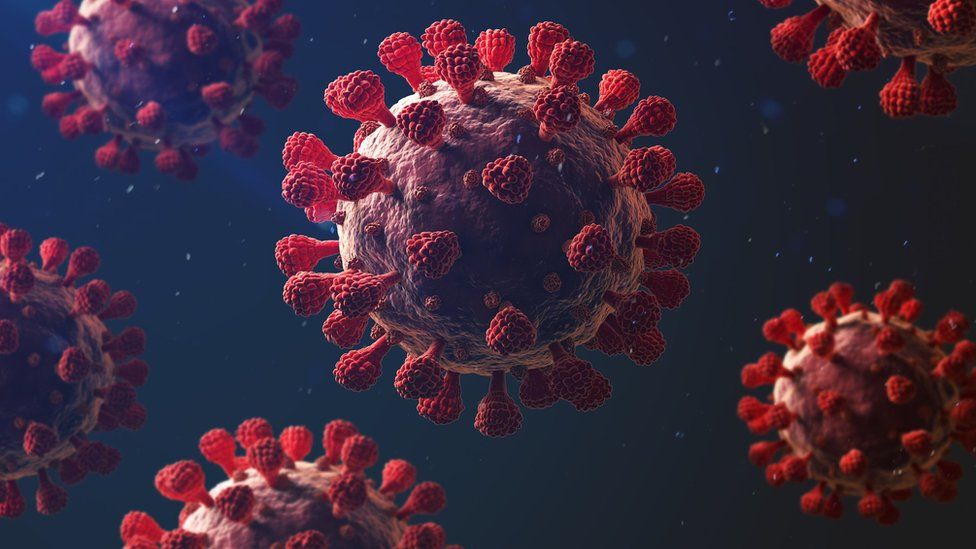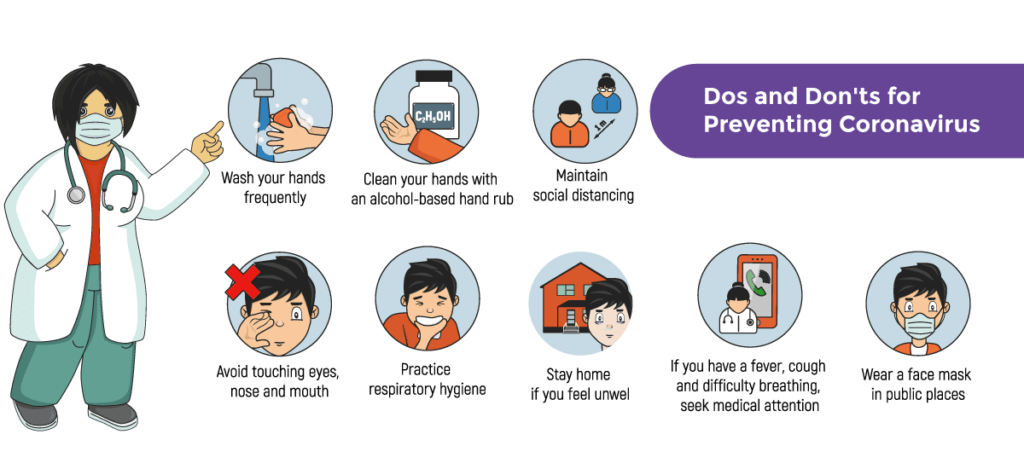Everyone can help lower the risk of contracting or transmitting coronavirus by taking a few simple precautions (COVID-19). Consider how you can protect yourself and your family by making safer decisions. Even if you are fully vaccinated, COVID-19 can still be caught and disseminated.

Anyone who has symptoms of COVID-19 or has a positive test result should stay at home and self-isolate as soon as possible. Even if you’ve had one or more doses of COVID-19 vaccination, you should schedule a PCR test as soon as possible if you exhibit symptoms of COVID-19.
We may all help by recognising settings where COVID-19 infection and transmission are more likely to occur and taking steps to limit those risks. We can all contribute by recognising and reducing the risk of COVID-19 infection and spread. If travelling is truly necessary during this Covid epidemic, it will necessitate paying close attention to local government regulations.
Coronavirus as the name indicates is a virus that primarily infects the nose and upper throat. The virus usually moves down the respiratory tract which includes the mouth, nose, throat, and lungs. The lower respiratory tract has more ACE2 receptors than the rest of your respiratory tract. So COVID-19 is more likely to go deeper than viruses like that of the common cold.
Covidvirus Replicates Fast
Whenever a virus widely circulates causing infections on a massive scale, the possibility of the virus getting mutated increases. The more the virus spreads, the more it replicates – and the more likely it undergoes changes. There are several kinds of Coronavirus, some are dangerous and life-threatening while some variants are not so hazardous.
Covid-19 the disease which is caused by SARS-CoV-2, which was first reported in December 2019. The transmission of Coronavirus is too fast. It spreads from person to person, by contact, nasal or mouth droplets, airborne- inhaled by the process of breathing, fomite, fecal transmission, bloodborne, and animal-to-human transmission and could be transmitted from mother to child.
Coronavirus better known as SARS-COV-2 causes respiratory illness ranging from mild symptoms to severe disease. It could be as fatal as to lead to the death of the patient. However, Asymptomatic patients infected with the virus never develop any symptoms. It has also been brought to notice that several asymptomatic carriers are the spreaders of this virus being unknown to the fact that they are infected by the virus.

Transmission can also occur through direct contact, indirect contact, or close contact with infected people. The infection occurs primarily through infected secretions such as respiratory secretions, droplets or through saliva. A fine mist of these droplets is expelled when an infected person sneezes, coughs or even while talking or singing.
The droplets that include the potent virus can reach the mouth, nose or eyes of a susceptible person and can result in infection. Hence covering of nose and mouth with the help of three-layered face masks is one of the most important preventive measures.
Cover your Eyes
Covering the eyes with sunglasses, power glasses or by face shield is also one of the important measures to safeguard oneself from the coronavirus. The eyes are one of the easiest gateways for the virus to enter the human body.
Depending upon the immune system of a person and considering the severity of their illness, indications start to show up within two to 14 days of exposure to the virus. There are several variants and the severity and the time is taken to show probable symptoms depends upon the variant of the virus that has been infected. Researchers, scientific teams and Doctors are studying the effect of the mutations on the infection as well as the reinfection potential, infection severity, diagnostic testing, vaccination and transmissibility.
Use of Scanners
Thermal scanners or any temperature gadgets cannot detect COVID-19 Thermal scanners are effective in detecting people having a higher than normal body temperature, or a condition which is commonly termed as body fever.
The scanners cannot detect people who are infected with COVID-19. There may be several causes of fever. Call your family physician or healthcare provider if you need assistance or seek urgent medical guidance if you have a fever and live in an area infested with malaria or dengue.
A person can remain contagious to others for 10 to 20 days after being infected with the coronavirus. SARS-COV-2 virus is highly contagious and Corona positive-patients and can infect others while it takes up to two days before symptoms appear in the newly infected persons.

After being infected the first few symptoms include mild fever, intermittent fever, sore throat, Itching in the throat while some complain about nasal congestion, cough and diarrhoea However, some asymptomatic patients are having no symptoms at all.
In some severe cases of COVID-19 it has been observed upon not receiving proper treatment or medical supervision and care, can lead to respiratory failure, resulting in the damage of lungs and heart muscle, while affecting the nervous system and the failure of the kidney often in many cases resulting in deaths.
Covering the face (nose and mouth) with a face mask is one of the most fundamental precautionary measures but, people should avoid wearing masks when exercising, as masks may reduce the ability to breathe comfortably.
Workout Or Exercise
A vital factor to keep in mind is that while exercising or working in the gym, sweat can make the mask wet or it may become moist which makes it difficult for the person to breathe while promoting the growth of microorganisms as well.
An important preventive measure to be adopted when in common places like markets, malls, public and private offices, Railway stations, Bus terminus Airports etc is to maintain a physical distance of at least two meters from others.
Regular washing of hands with soap, detergents, liquid hand wash and with proper use of hand sanitiser, helps to kill the covid virus and protect us from getting infected. The washing of hands should be for at least 30 seconds to 1 minute with clean water.
The myth of intaking too much water, or drinking water every 15 minutes, will keep the coronavirus at bay is not correct. While drinking enough water does not guarantee that one would remain uninfected from the virus, however, drinking water helps to oxygenate cells, thus being hydrated boosts the immune system of our body while ensuring that the body can fight the infection in a much more formidable way if at all infected by the coronavirus.

Get Vaccinated
Vaccines have now arrived and it is supposed to prevent infection with SARS-CoV-2, which causes COVID-19, But it is too early to claim that it’s all well with the Vaccines because a lot of research is still underway regarding how it affects a person’s ability to transmit the virus. Therefore precautions such as physical distancing, mask-wearing, and hand hygiene should continue regardless of a person’s vaccination status to help prevent the spread of COVID-19.
One should be aware that Antibiotics do not work against viruses.SARS-CoV-2 is in a family of viruses called Coronaviridae. Antibiotics are useful in infections caused by bacteria. It has been observed that people who are infected with coronavirus can also develop a bacterial infection as a complication. Under such circumstances, Antibiotics can be prescribed.
Through research and studies are going at a brisk pace, there is currently no licensed medication to cure COVID-19. If you feel ill and find symptoms related to COVID-19, you should immediately call your family physician, health care agencies, hospital or Covid-19 hotline and take necessary advice.
Too much or excessive spraying and introducing bleach or another disinfectant into your body is extremely hazardous and will be counterproductive in protecting you against COVID-19 and can be very dangerous. It may lead to fatal disorders and poisoning.
Do not spray disinfectant or sanitiser into your body. These substances if ingested cause irritation and damage to your skin and eyes. Bleaching powders and disinfectant sprays should be used carefully to disinfect surfaces only. Take utmost care to keep chlorine (bleach) and other disinfectants out of the reach of children.
Covid-19 is susceptible to all age groups
Covid-19 is susceptible to all age groups. Older, as well as younger people, can be infected by the COVID-19 virus. However it is more likely to affect older people, and people with pre-existing medical conditions such as heart disease, diabetes, and asthma, appear to be more vulnerable to becoming severely ill with the virus. Persons with comorbidity are more vulnerable to catch the infection and hence should be more careful while going to places or areas where the infection rate is very high.

Due to the fear of catching COVID-19 people are getting paranoid and taking extra and unwarranted steps concerning their health and safeguarding it by all means. While some have been heavily taking the course of traditional and home remedies like kadha and other indigenously prepared drinks to stay healthy, many have gone to the far extreme of taking to self-medication- from multivitamins to Vitamin C and from Vitamin E to Vitamin D, there has been an exponential rise in people stocking up on ‘immunity-boosting medicines. Overuse of medicines may result in toxicity and drug resistance in the body.
Avoid Self Medication
Medications work on a case-to-case basis, People should not blindly copy prescriptions meant for an individual covid-19 patient, and start to consume those drugs as a means of protection. From covid-19 infection. Random drug abuse has been reported at several places across the world especially for a disease as critical as COVID-19.
A medicine that may prove useful for one, may not be suitable for another, and at times may bring on additional health problems. Medicines only work the best when they are used in a certain followed dose as advised by a medical practitioner. If not, it can be more harmful resulting in irreparable damage caused and can wreak havoc to one’s natural system of his body.
Coronavirus spreads on all temperature conditions
Coronavirus is not related to any particular temperature conditions. WHO advises people of all ages to take preventive measures and to take steps to protect themselves from the virus. It can be achieved by maintaining hand hygiene and following good respiratory hygiene. Taking a hot bath will not arrest the COVID-19 virus, nor will it prevent you from getting infected. The normal human body temperature remains around 36.5°C to 37°C, regardless of the temperature of your bath or shower. Taking a hot bath with extremely hot water can be harmful, as it can burn you.
Some of the most common symptoms of covid -19 include symptoms includes, Cough, Shortness of breath or difficulty breathing, Sore throat, Congestion or runny nose, Muscle or body aches, Fever or chills, New loss of taste or smell, Diarrhea, Nausea or vomiting, Headache, and New fatigue associated with tremendous Weakness and Lethargy.
The last word, Maintain Distance, Wear Mask, Maintain Hygiene and Cleanliness, Wash hands with soap regularly, Drink Adequate amount of water, Do not indulge in self medication, Follow local Guidelines issued by local Authorities and consult immediately with Doctor, your Family Physician, or Health care Authorities upon development of any symptoms related to Covid-19








Pingback: The Impact of Covid-19 on Restaurants, Food Joints - The Support You Can Provide
Pingback: The Decline Of Indian National Congress - The Rahul Gandhi Card.